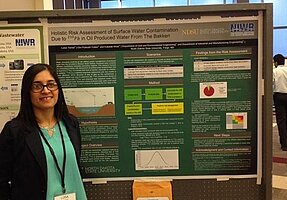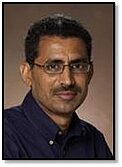Holistic Risk Assessment of Surface Water Contamination Due to Lead-210 Found in Produced Water from Unconventional Oil Production in North Dakota

Luisa F. Torres is originally from Guatemala, where she began her study in Industrial Engineering. In 2011, she continued her undergraduate education at North Dakota State University as an exchange student through the UGRAD scholarship sponsored by the U.S. Government. After the program concluded, she decided to transfer to NDSU. In December of 2012, she earned the Bachelor’s degree in Industrial Engineering and Management. After obtaining her degree, she returned to Guatemala to work as an Industrial Engineer and applied the knowledge she gained as an undergraduate student. During that time, she realized that her curiosity about the environment, and modern issues related to it, was the direction she wanted to pursue as a career. She had an opportunity to talk to Dr. Eakalak Khan and Dr. Om Yadav and they mentioned a possibility of joining their research groups. Luisa applied to NDSU and was admitted to the graduate program of Master of Science in Environmental Engineering in the fall of 2014.
Fellow: Luisa F Torres
Advisor: Advisor: Dr. Eakalak Khan, P.E., Professor, Department of Civil and Environmental Engineering, North Dakota State University.
Co-Advisor: Dr. Om Prakash Yadav, Professor, Department of Industrial and Manufacturing Engineering
Degree Progress: Master of Science in Environmental Engineering, expected graduation in Summer 2016.
Holistic Risk Assessment of Surface Water Contamination Due to Lead-210 Found in Produced Water from Unconventional Oil Production in North Dakota
Luisa’s thesis research focuses on performing holistic risk assessments of different contaminants found in produced water from unconventional oil and gas development. In addition, social risk perceptions are being studied and included in the risk assessments.
Project Objectives:
- Understand and prioritize the risks to water quality that could result from unconventional oil and gas development.
- Characterize the risk by performing a holistic risk assessment that also includes social risk perception and impacts.
- Propose solutions and mitigation plans to reduce the risks analyzed.
Progress:
Luisa has published a literature review paper in the Science of The Total Environment Journal (doi:10.1016/j.scitotenv.2015.09.030). Currently, she is finishing the first holistic risk assessment on lead-210 (Pb-210) in produced water and its implication in spills and surface water contamination. Also, she and her advisors are starting to work on a second holistic risk assessment where the contaminants under study are barium (Ba) and strontium (Sr) and their relation with radium-226 (Ra-226) concentration in produced water. Moreover, a social perception survey has been distributed in different counties in the State to collect data used for the holistic risk assessment. Furthermore, she has participated in poster presentations at the 2015 AWWA Water Quality Technology Conference, the 2016 ND Water Quality Monitoring Conference, and the upcoming PA-AWWA’s 68th Annual Conference held in May, 2016.
Significance:
The results of this research will determine the risks of surface water contamination and the impacts on the environment and human health. In addition, the risk perception from different stakeholders in North Dakota is going to be established. Some of the contaminants found in the produced water are well known and have been extensively studied in the past but there are some which impacts are not completely understood. One example is radioactive material which is considered for this research. For the Pb-210 risk assessment, the initiating events, or situation that promote the risk of water contamination were identified. The frequency or probability of those risks to happen were assessed using qualitative and quantitative methods. Lastly, the consequences of the risks were determined focusing on the environment and human health. Similar results are expected to be obtained for the second risk assessment focused on Ba and Sr. The outcome of this thesis will give a better understanding on the importance of holistic risk assessment in the unconventional oil and gas industry by showing the potential impacts on human health and the environment. Moreover, this research will serve as a basis for future studies on produced water from unconventional oil and gas development.

Eakalak Khan
Civil & Environmental Engineering

Om Prakash Yadav
Industrial and Manufacturing Engineering
Office: CIE202F
Telephone: 701-231-7285
Email: om.yadav@ndsu.edu


